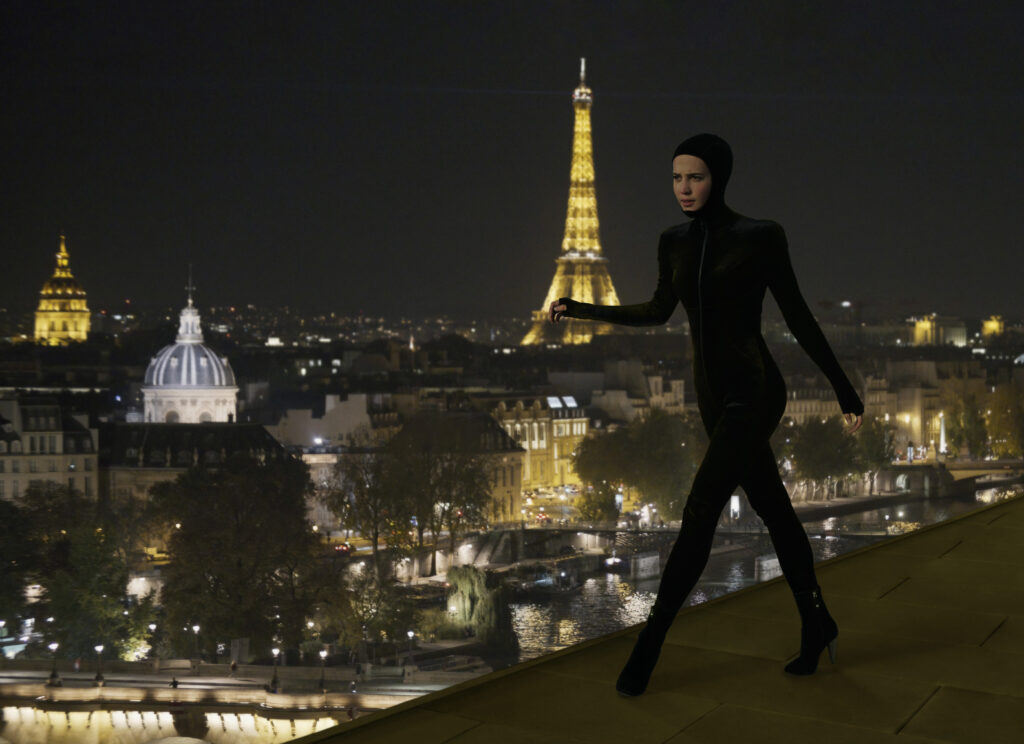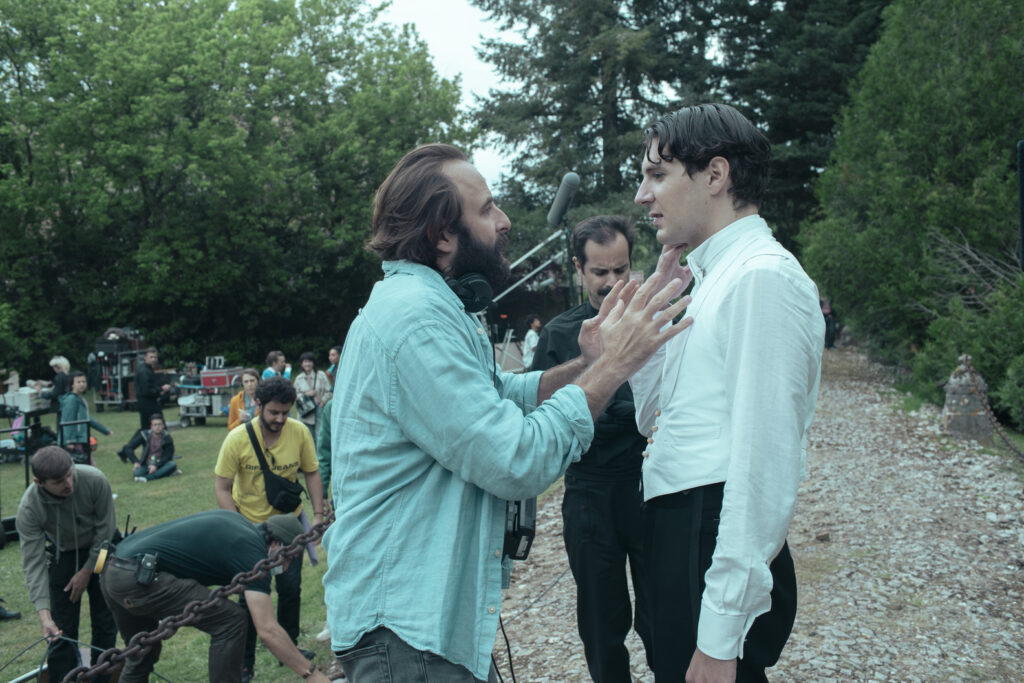Want to hear more from the actors and creators of your favorite shows and films? Subscribe to The Cinema Spot on YouTube for all of our upcoming interviews!
Episode 3 of any show is where I, as a viewer, usually start to settle in. Depending on the length of the series, we’re either settling into the first arc, or well on our way to halfway through the story. If you’re binging a show, episode 3 is usually when you decide to commit to the whole thing. It’s an important week, to put it simply, and Irma Vep did not disappoint! We’ve got drama, we’ve got gossip, we’ve got drink-throwing and crack deliveries, and if you’re anything like me, you probably left this episode with more questions than answers. What better way to bring us back for episode 4?
**Some spoilers ahead**

What Happened on Episode 3?
We got to spend a lot of time off-camera this episode, getting to know our characters outside of work a bit more. We start with the cast and crew convening at a house party to discourse on the nature of art. Then, we witness Gottfried’s immediate aftermath, as well as Mira’s version of a hangover the next day on a bit of a tense set. Mira and Regina continue the artistic conversation after Gottfried takes an… interesting interview, and then they all get together for a little personality clash before heading home for the night. We finally meet the oldest of Mira’s Mysterious Exes, actor (and star?) Eamonn. And René keeps going to therapy, although his progress is questionable. Lots to unpack here, especially with the men of the show. Let’s get into it!
A Frank Discussion on Filmic Art
The major theme of the episode, beyond the romantic entanglements and interpersonal drama, was the question of whether movies count as art. Of course, any insufferable film student like me will tell you that question is a ball of worms made of balls of worms. What is film? What is art? If it’s commercialized, does it still count? What are the decisions that take something from being a work of art and transform it into a work of commerce?
The format, subject matter, and history of this show makes the characters perfect avatars through which to conduct this conversation, and writer-director Oliver Assayas doesn’t pick much of a side in the conversation. In my opinion, that’s a great creative choice to make; these are conversations that can’t be answered by the show, or by any one person. It also shows a bit of growth compared to Irma Vep ‘96, in which characters had more hard-line, definitive opinions about the nature of cinema as art, cultural production, and more specifically about French industry concerns of the day.
Since the first Irma Vep was released (which happens to also be the span of my own lifetime), widespread internet access, streaming services, and an increasingly globally-focused upper echelon of movie-making has totally changed the orientation from which one can approach these deep, foundational questions. The conversations had in this episode reflected the chasm of that shift really well.
I will say, however, that Assayas (wisely) also used these conversations as an opportunity to poke fun at self-appointed philosophers of cinema. In spite of being a big star, Mira is our window into this perspective, telling Gottfried to “stop being annoying,” and giving Devon big “do you know what you sound like?” eyes when she tried to discuss deeper themes in a zombie movie Mira and Gottfried made together. More than once during this episode I had to ask myself: Is this what I sound like? And all I could do afterwards was laugh.
The Men of Irma Vep
Eamonn
The way I’m approaching The Eamonn Discussion is pretty indicative of my feelings towards the character; let’s get him out of the way first and move on to more interesting things. This is the man everybody’s talking about? Mira’s oldest flame? The juice around him has ended up being more interesting to me than the juice he came with himself. Sure, he’s the guy Mira cheated on with Laurie. Sure, he’s having a baby, and I guess that’s a big deal. But in the face of Regina’s sudden (dis)Respectful Look in the hotel bathroom mirror? In the face of all that chemistry and tension with Zoe The Postmodern Lesbian, on-set and off? This was an underwhelming man with an underwhelming bag of plot, and it felt like he was included to throw the straight girls a non-problematic bone. I definitely found it interesting that Alicia Vikander’s chemistry in these scenes was way more off-the-charts than with any of her female counterparts. It remains to be seen whether this is a deliberate acting choice or not.
Edmond
Now, at the beginning of this episode, Edmond was just another underwhelming white man. But as we see more and more of him outside of his antics with René, it becomes a more complicated question. First of all, Severigne has disappeared, and this episode we see him kiss some other woman goodbye. So did he cheat on Severigne? Where is this thread going? Second of all, is Edmond a smart person? He clearly feels deeply about his craft, and thinks hard about the philosophy of it all, since he’s judging René for doing TV. But René doesn’t see him as smart, and through their on-set conversations, I’m lead to believe he’s not smart either. After all, René tells him his character is simply saying what someone wants to hear in order to make them do what he wants… all while René is himself doing that to Edmond in that very conversation. I’m not afraid to admit this might be too deep for me, but I appreciate that my expectations are, at the very least, being teased around while I wait to learn more of this character.

René
Do I trust René? Less with each day that passes in show time. Do I love him? Yes, because he is anxious in a way that’s extremely familiar (and therefore adorable) to me. His behavior on-set is becoming more eccentric, but in ways that I recognize even in my limited experience as an auteur director. For example, the way he has shifted to obnoxiously over-explaining every piece of every scene totally reads as an attempt to account for the millions of questions and little details he has spent refining and explaining to actors who didn’t read the script. Additionally? Every time Mira makes a snide feminist comment, it sends him into a tizzy of self-correction. He is incredibly concerned with 2 things: making a perfect film (impossible) and hiding his eccentricities (impossible). Stars: they’re just like us!
That being said, his therapy sessions and his mood swings with Edmond have got me so worried. What are we complicating when we get to watch the therapeutic discussions of the self-insert character of a person who is literally doing the same thing as the self-insert is? The real-life layers of this show are more complicated than Inception and Tenet put together, and they leave us with a lot of interesting puzzle pieces. For instance, it’s interesting that they added the complication of a marriage to the in-story history of the film, and it’s interesting that the marriage is a concrete reason for the casting shift to an American. It’s interesting that this show is clearly becoming a study of the role relationships play in the collaborative work of filmmaking. It’s extremely interesting that immediately after we make that point, we’re back to brutalizing Edmond. René dug into the depths of his mind and emotional state, and his subconscious reaction to that was throwing his lead down a bunch of steep outdoor steps. What’s going on with this guy, seriously? I can’t wait to find out.
Gottfried
Remember when I said Gottfried disgusts us on purpose? Episode 3 seemed to specifically want to prove that. From falling out at the party and yakking repeatedly on the way to set, to the horrendous way he speaks to and about women, I don’t think there was a single moment when he was on-screen that didn’t have me going, “I hate this guy.”
But this episode also made me realize that at least some of that persona must be just that: a persona. Most of the time when he speaks, he’s obnoxious, impolite, and generally out to shock people. But when Regina gives him a genuine compliment on his work on a zombie movie, he suddenly has nothing to say. That’s a very different person from the man who told his interviewers Latinos were stealing his jobs and all gays are communisits. Even his reasons for playing Moreno seems a little theatrical: “Moreno is evil. Genuine evil. All the other guys are fucking amateurs.” Perhaps, instead of being a standard guy-we-love-to-hate, Gottfried is more complicated than that. Only time and episode 4 can tell!
Be sure to check back for our review of next week’s episode of Irma Vep, streaming on HBO and HBO Max now! And give us some follows and likes on our social medias to stay up to date with the latest developments of the series: Twitter (@TheCinemaSpot), Instagram (@thecinemaspot_), Facebook (@TheCinemaSpotFB).
Let us know your thoughts on this episode in the comments below, we’d love to hear from you!
This article was edited by Zach Smith.

